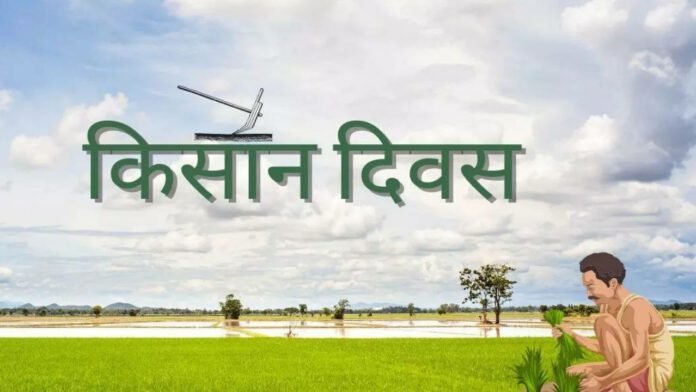Introduction
Kisan Diwas, also known as National (Kisan Diwas)Farmers‘ Day, is an annual celebration in India that pays tribute to the backbone of the nation – the farmers. Celebrated on December 23rd each year, Kisan Diwas holds immense significance as it marks the birth anniversary of Chaudhary Charan Singh, the fifth Prime Minister of India, who was a staunch advocate for the rights of farmers. The day serves as a reminder of the invaluable contribution made by farmers to the nation’s prosperity and highlights the challenges they face. In 2023, as we celebrate Kisan Diwas, it becomes imperative to reflect on the current state of agriculture in India and discuss the initiatives and reforms aimed at uplifting the farming community.
Historical Perspective
Chaudhary Charan Singh, born on December 23, 1902, was not only a political leader but also a champion of farmers’ rights. His tenure as the Prime Minister from 1979 to 1980 witnessed several policy measures aimed at improving the conditions of farmers. He was a firm believer in sustainable and inclusive agricultural practices and worked towards creating a supportive environment for the farming community.
The Current Agricultural Landscape
- As we observe Kisan Diwas in 2023, it is crucial to take stock of the current agricultural scenario in India. Agriculture has been the mainstay of the Indian economy, employing a significant portion of the population. However, the sector faces numerous challenges, including fragmented land holdings, outdated farming techniques, inadequate access to credit, and the unpredictable nature of agriculture.
- In recent years, farmers have grappled with issues such as water scarcity, soil degradation, and the impact of climate change. The agrarian distress has led to increased instances of farmer suicides, bringing to light the urgent need for comprehensive reforms in the agricultural sector.
Government Initiatives and Reforms
- In response to the challenges faced by farmers, the Indian government has implemented various initiatives and reforms to revitalize the agricultural sector. One of the significant steps is the Pradhan Mantri Kisan Samman Nidhi (PM-KISAN) scheme, launched in 2019. Under this scheme, small and marginal farmers receive direct income support of Rs. 6,000 per year. The scheme aims to provide financial assistance to farmers, enhancing their purchasing power and improving their overall well-being.
- The introduction of the Agricultural Produce Market Committees (APMC) Act, 2020, and the Farmers’ Produce Trade and Commerce (Promotion and Facilitation) Act, 2020, are notable reforms aimed at liberalizing agricultural trade. These acts intend to empower farmers by allowing them to sell their produce outside traditional mandis (marketplaces) and engage in contract farming.
- However, these reforms have been met with mixed reactions, with concerns raised about the potential exploitation of farmers by corporate entities and the need for a robust support system for small and marginal farmers.
ALSO READ| Relations Between Brazil And India Improved Even More After G20.
Challenges and Opportunities
While the government’s efforts to bring about positive changes in the agricultural sector are commendable, challenges persist. Sustainable farming practices, water conservation, and the adoption of technology are areas that require focused attention. The farming community needs access to modern tools, techniques, and information to enhance productivity and reduce dependency on conventional practices.
Climate-smart agriculture, which involves the use of technology to mitigate the impact of climate change, is an avenue that holds great promise. Precision farming, organic farming, and the promotion of indigenous crops can contribute to both environmental sustainability and increased agricultural yields.
The Role of Technology
In the digital age, technology has the potential to revolutionize agriculture. The adoption of precision agriculture, which involves the use of sensors, GPS technology, and data analytics, allows farmers to optimize their resources and make informed decisions. Mobile applications providing real-time weather information, market prices, and agricultural best practices empower farmers and connect them to a broader network.
Additionally, the use of artificial intelligence and machine learning can assist in crop monitoring, disease prediction, and yield optimization. Embracing agtech not only enhances productivity but also attracts the younger generation to agriculture by making it more tech-savvy and economically viable.
Empowering Women in Agriculture
- While discussing agriculture, it is essential to acknowledge the significant role played by women in farming. In many rural households, women are actively involved in various agricultural activities, from sowing seeds to harvesting crops. However, their contributions often go unnoticed.
- Empowering women in agriculture involves providing them with equal access to resources, education, and financial support. Recognizing and valuing their role can lead to more sustainable and inclusive agricultural practices. Kisan Diwas serves as a platform to highlight and appreciate the efforts of women in agriculture and to promote gender equality in the sector.
Conclusion
As we celebrate Kisan Diwas in 2023, it is crucial to recognize the vital role that farmers play in sustaining the nation. The day is not just a tribute to Chaudhary Charan Singh but a collective acknowledgment of the hard work, resilience, and dedication of farmers across the country. While challenges persist, the ongoing reforms and the integration of technology provide a ray of hope for the future of agriculture in India.
Kisan Diwas should not only be a day of celebration but also a day of reflection and action. It is an opportunity for policymakers, agricultural experts, and the community at large to come together and chart a path for sustainable and inclusive growth in the agricultural sector. By addressing the challenges, harnessing the potential of technology, and empowering the farming community, India can ensure a prosperous and resilient future for its farmers. As we commemorate Kisan Diwas in 2023, let it be a catalyst for positive change and a renewed commitment to the well-being of those who feed the nation.



Excellent write-up